|
Books Should Be Free Loyal Books Free Public Domain Audiobooks & eBook Downloads |
|
|
Books Should Be Free Loyal Books Free Public Domain Audiobooks & eBook Downloads |
|
Top Authors |
|---|
|
Book type:
Sort by:
|
By: Archibald Alexander (1874-1942) | |
|---|---|
 Glory in the Grey
Glory in the Grey
It sometimes happens, when we are dispirited, that God's gracious gift of reviving comes to us along a very ordinary channel--in the form, perhaps, of some tonic, heartening passage found in reading, or the "morning face" and cheerful greeting of a friend. That is often all that we need--when our hurt is not serious-- to send us back with a new zest and courage to our tasks; and that is the sort of usefulness which is desired for this book.It does not pretend to deal with the great themes or the great hours of the religious life, but only with some of its simple encouragements and ideals for everyday... | |
 Day at a Time and Other Talks on Life and Religion
Day at a Time and Other Talks on Life and Religion
This book [was] written in war-time to minister comfort and, if it may be, to reinforce hope and faith. | |
By: Archibald Forbes (1838-1900) | |
|---|---|
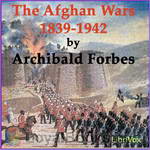 The Afghan Wars 1839-42 and 1878-80, Part 1
The Afghan Wars 1839-42 and 1878-80, Part 1
The First Anglo–Afghan War was fought between British India and Afghanistan from 1839 to 1842. It was one of the first major conflicts during the Great Game, the 19th century competition for power and influence in Central Asia between the United Kingdom and Russia, and also marked one of the worst setbacks inflicted on British power in the region after the consolidation of British Raj by the East India Company. | |
 Afghan Wars 1839-42 and 1878-80, Part 2
Afghan Wars 1839-42 and 1878-80, Part 2
This Part 2 of "The Afghan Wars 1839-42 and 1878-80" discusses the 1878-80 war, which was one of the major conflicts during the Great Game, the 19th century competition for power and influence in Central Asia between the United Kingdom and Russia, and also marked one of the worst setbacks inflicted on British power in the region after the consolidation of British Raj by the East India Company. - Summary by Lynette Caulkins and Phil Griffith | |
By: Archibald Geikie (1835-1924) | |
|---|---|
 Scottish Reminiscences
Scottish Reminiscences
Archibald Geikie was a geologist in Scotland by profession, and a writer. While most of his writings were professional, this is a more personal book telling some of the history of Scotland, Archibald's memories, experiences and recollections there as well as stories he was told by people he met. He has a good sense of humour which shines through. - Summary by Jmbau13 | |
By: Archibald Gracie (1858-1912) | |
|---|---|
 Truth about the Titanic
Truth about the Titanic
Colonel Archibald Gracie was the first survivor of the sinking of the Titanic to die, and this first-hand account was published posthumously. He attempts to dispel some of the rumors surrounding the tragic event and gives his personal observations and an account of his survival clinging to the hull of an overturned collapsible lifeboat after helping many others to escape safely. A large portion of the book is given to personal accounts of other survivors from both the American and British boards of inquiry, boat by boat. - Summary by Larry Wilson | |
By: Archibald Grimké (1849-1930) | |
|---|---|
 William Lloyd Garrison, the Abolitionist
William Lloyd Garrison, the Abolitionist
"THE author of this volume desires . . . to say . . . that it is his earnest hope that this record of a hero may be an aid to brave and true living in the Republic, so that the problems knocking at its door for solution may find the heads, the hands, and the hearts equal to the performance of the duties imposed by them upon the men and women of this generation. William Lloyd Garrison was brave and true. Bravery and truth were the secret of his marvelous career and achievements. May his countrymen and countrywomen imitate his example and be brave and true, not alone in emergent moments, but in everyday things as well." | |
By: Archibald MacMechan (1862-1933) | |
|---|---|
 Chronicles of Canada Volume 27 - The Winning of Popular Government: A Chronicle of the Union of 1841
Chronicles of Canada Volume 27 - The Winning of Popular Government: A Chronicle of the Union of 1841
In the 1830's, Canada was a ideologically divided country. Political upheaval and even riots occurred over Canada's future. Would it remain a subsidiary of England? Would it form its own republic, or even merge with the United States? This work tells of how some of Canada's founding fathers crossed the bridge between past and future. | |
By: Archibald Primrose (1847-1929) | |
|---|---|
 Pitt
Pitt
Archibald Primrose, 5th Earl of Rosebery, liberal prime minister , wrote this short biography of William Pitt, the Younger , the controversial young prime minister who led Great Britain during the terrible trial of the Napoleonic Wars. Lord Rosebery writes: "From the dead eighteenth century his figure still faces us with a majesty of loneliness and courage. There may have been men both abler and greater than he, though it is not easy to cite them; but in all history there is no more patriotic spirit, none more intrepid, and none more pure." | |
By: Archibald Williams (1871-1934) | |
|---|---|
 Romance of Modern Invention
Romance of Modern Invention
This is a volume of exploration into the newest inventions of the turn of the previous century. Journalist Archibald Williams walks the reader through diverse inventions which were changing the world at just that point in time. - Summary by Carolin | |
 Romance of Modern Mechanism
Romance of Modern Mechanism
In 1910, when this book was published, the advancement of modern mechanism was still moving at a rapid pace. It must have seemed like very day, new inventions were made to make life easier. Most of these are still very much in use today, such as the lawn-mower, automatic milking machines in the dairy industry, fire engines, and escalators. Learn about how these worked in this volume. - Summary by Carolin | |
 Romance of Modern Engineering
Romance of Modern Engineering
As it would be impossible to treat, in the compass of a few hundred pages, all the great engineering feats of modern times without reducing individual accounts to uninteresting brevity, the author has preferred, where selection is possible, to take typical instances of engineering practice, and, by the aid of comparatively detailed descriptions, to place the reader in a position to appreciate them and similar undertakings. - Summary by Adapted from the Preface | |
By: Aristophanes (446BC - 385BC) | |
|---|---|
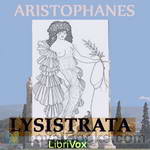 Lysistrata
Lysistrata
Lysistrata read by the Classics Drama Company at DePaul. The Classics Drama Company at DePaul is a new gathering of Thespians and Classicists dedicated to performing and understanding ancient literature. If you live in Chicago and attend DePaul University, we welcome new additions to our group. Contact Dr. Kirk Shellko (kshellko@depaul.edu), if interested.First performed in classical Athens c. 411 B.C.E., Aristophanes’ Lysistrata is the original battle of the sexes. One woman, Lysistrata, brings together the women of all Greece, exhorting them to withhold sexual contact from all men in order that they negotiate a treaty... | |
 Lysistrata (version 2)
Lysistrata (version 2)
Lysistrata has had enough. She is tired of the constant war that is ravaging Greece and has come up with a solution: Together with female friends from other Greek cities, she persuades all women of Greece to pledge an oath and refrain from all sexual contact with their husbands and lovers. The idea is that what men really want is sex, and that they are willing to do anything to get it - even abandoning their pride and make peace. And while the Athenian women retreat into the sacred Acropolis, the men gather outside and debate what is to be done... | |
 Lysistrata (version 3)
Lysistrata (version 3)
The women of Athens are sick of the Peloponnesian war that has dragged on for year after year after year, causing great hardship to everyone. They decide to deny the men sex until they agree to make peace, using the one thing that perhaps men enjoy more than killing each other. Does it work? Listen and find out. This comedy by Aristophanes was first performed in 411 BC | |
By: Aristotle (384-322) | |
|---|---|
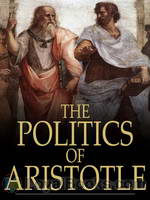 Politics
Politics
The Politics, by the ancient Greek philosopher Aristotle, is one of the most influential texts in political philosophy. In it, Aristotle explores the role that the political community should play in developing the virtue of its citizens. One of his central ideas is that “Man is a political animal,” meaning that people can only become virtuous by active participation in the political community. Aristotle also criticizes his teacher Plato, classifies and evaluates six different types of constitutions and political institutions, and describes his vision of the ideal state... | |
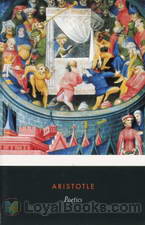 Poetics
Poetics
Aristotle’s Poetics from the 4th century B.C. aims to give a short study of storytelling. It discusses things like unity of plot, reversal of situation, and character in the context of Greek tragedy, comedy and epic poetry. But it still applies today. It is especially popular with screenwriters as seen in many script gurus’ how-to books. | |
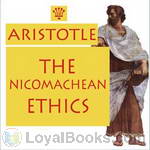 The Nicomachean Ethics
The Nicomachean Ethics
The work consists of ten books, originally separate scrolls, and is understood to be based on notes said to be from his lectures at the Lyceum which were either edited by or dedicated to Aristotle's son, Nicomachus. In many ways this work parallels the similar Eudemian Ethics, which has only eight books, and the two works can be fruitfully compared. Books V, VI, and VII of the Nicomachean Ethics are identical to Books IV, V, and VI of the Eudemian Ethics. Opinions about the relationship between the two works, for example which was written first, and which originally contained the three common books, is divided... | |
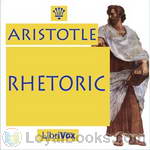 Rhetoric
Rhetoric
The Rhetoric was developed by Aristotle during two periods when he was in Athens, the first between 367 to 347 BCE (when he was seconded to Plato in the Academy), and the second between 335 to 322 BCE (when he was running his own school, the Lyceum). The Rhetoric consists of three books. Book I offers a general overview, presenting the purposes of rhetoric and a working definition; it also offers a detailed discussion of the major contexts and types of rhetoric. Book II discusses in detail the three means of persuasion that an orator must rely on: those grounded in credibility (ethos), in the emotions and psychology of the audience (pathos), and in patterns of reasoning (logos)... | |
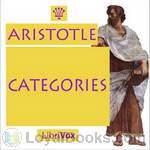 Categories
Categories
Categories is the first of Aristotle's six texts on logic which are collectively known as the Organon. In Categories, Aristotle enumerates all the possible kinds of things that can be the subject or the predicate of a proposition. Aristotle places every object of human apprehension under one of ten categories (known to medieval writers as the praedicamenta). Aristotle intended them to enumerate everything that can be expressed without composition or structure, thus anything that can be either the subject or the predicate of a proposition. The ten categories, or classes, are: Substance, Quantity, Quality, Relation, Place, Time, Position, State, Action and Affection. | |
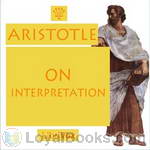 On Interpretation
On Interpretation
Aristotle's On Interpretation (Greek Peri Hermeneias) or De Interpretatione (the Latin title) is the second of Aristotle's six texts on logic which are collectively known as the Organon. On Interpretation is one of the earliest surviving philosophical works in the Western tradition to deal with the relationship between language and logic in a comprehensive, explicit, and formal way. The work begins by analyzing simple categoric propositions, and draws a series of basic conclusions on the routine... | |
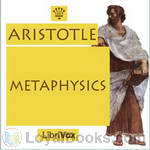 Metaphysics
Metaphysics
Metaphysics is essentially a reconciliation of Plato’s theory of Forms that Aristotle acquired at the Academy in Athens, with the view of the world given by common sense and the observations of the natural sciences. According to Plato, the real nature of things is eternal and unchangeable. However, the world we observe around us is constantly and perpetually changing. Aristotle’s genius was to reconcile these two apparently contradictory views of the world. The result is a synthesis of the naturalism of empirical science, and the mysticism of Plato, that informed the Western intellectual tradition for more than two thousand years... | |
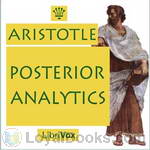 Posterior Analytics
Posterior Analytics
Posterior Analytics is the fourth of Aristotle's six texts on logic which are collectively known as the Organon ("Instrument"). Posterior Analytics deals with demonstration, definition, and scientific knowledge. Demonstration is distinguished as a syllogism productive of scientific knowledge, while Definition is marked as the statement of a thing's nature, a statement of the meaning of the name, or of an equivalent nominal formula. | |
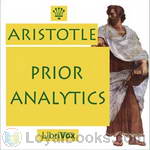 Prior Analytics
Prior Analytics
Prior Analytics is the third of Aristotle's six texts on logic which are collectively known as the Organon ("Instrument"). In Prior Analytics Aristotle conducts a formal study of arguments. In logic an argument is a series of true or false statements which lead to a true or false conclusion. Aristotle identifies valid and invalid forms of arguments called syllogisms. A syllogism is an argument consisting of three sentences: two premises and a conclusion. Of the entire Aristotelian corpus, Aristotle gives priority to the study of his treatises on Logic. | |
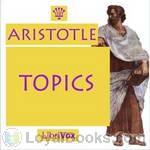 Topics
Topics
The Topics is is the fifth of Aristotle's six texts on logic which are collectively known as the Organon ("Instrument"). The Topics constitutes Aristotle's treatise on the art of dialectic—the invention and discovery of arguments in which the propositions rest upon commonly-held opinions or endoxa. Topoi are "places" from which such arguments can be discovered or invented. In his treatise on the Topics, Aristotle does not explicitly define a topos, though it is "at least primarily a strategy for argument not infrequently justified or explained by a principle." | |
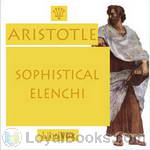 Sophistical Elenchi
Sophistical Elenchi
De Sophisticis Elenchis is the sixth of Aristotle's six texts on logic which are collectively known as the Organon ("Instrument"). In De Sophisticis Elenchis Aristotle identifies 13 falacies. Verbal Fallacies are: Accent or Emphasis; Amphibology; Equivocation; Composition; Division and Figure of Speech. Material Fallacies are: Accident; Affirming the Consequent; Converse Accident; Irrelevant Conclusion; Begging the Question; False Cause and Fallacy of Many Questions. | |
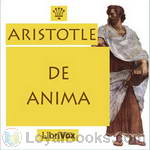 De Anima
De Anima
On the Soul (Greek Περὶ Ψυχῆς (Perì Psūchês), Latin De Anima) is a major treatise by Aristotle on the nature of living things. His discussion centres on the kinds of souls possessed by different kinds of living things, distinguished by their different operations. Thus plants have the capacity for nourishment and reproduction, the minimum that must be possessed by any kind of living organism. Lower animals have, in addition, the powers of sense-perception and self-motion (action). Humans have all these as well as intellect... | |
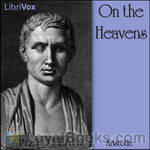 On the Heavens
On the Heavens
On the Heavens (Greek: Περί ουρανού, Latin: De Caelo or De Caelo et Mundo) is Aristotle's chief cosmological treatise. In it Aristotle argues that the Earth is a sphere by pointing to the evidence of lunar eclipses. Aristotle also provides a detailed explanation of his theory of 'gravity' arguing that things which contain 'earth' fall towards the centre of the Universe because 'earth' is naturally attracted to the centre of the Universe. Aristotle argues that if the planet Earth was moved to the location of the Moon then objects which contain 'earth' would not fall towards the centre of the Earth but rather towards the centre of the Universe... | |
 On Generation and Corruption
On Generation and Corruption
On Generation and Corruption (Ancient Greek: Περὶ γενέσεως καὶ φθορᾶς, Latin: De Generatione et Corruptione, also known as On Coming to Be and Passing Away) is a treatise by Aristotle. Like many of his texts, it is both scientific and philosophic (although not necessarily scientific in the modern sense). The philosophy, though, is essentially empirical; as in all Aristotle's works, the deductions made about the unexperienced and unobservable are based on observations and real experiences... | |
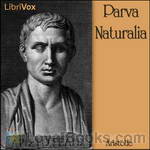 Parva Naturalia
Parva Naturalia
Parva Naturalia [the "short treatises on nature" (a conventional Latin title first used by Giles of Rome)] is a collection of books by Aristotle, which discuss natural phenomena involving the body and the soul. The books are as follows:I - On Sensation and the SensibleII - On Memory and RecollectionIII - On Sleeping and WakingIV - On DreamsV - On Prophecy in SleepVI - On Longevity and Shortness of LifeVII - On Youth and Old Age, Life and Death VIII - On Respiration | |
 On the Parts of Animals
On the Parts of Animals
On the Parts of Animals by Aristotle . The first book asks whether animals were designed or came into existence by chance. The remaining three books focus on particular examples of various animals and the functions of their organs. The translator William Ogle, who was both a medical doctor and classicist, presented Charles Darwin with a copy of this translation. | |
 Opuscula
Opuscula
Opuscula is a collection of shorter books that may or may not have been written by Aristotle. 1. On Colours 2. On Things Heard 3. Physiognomonics 4. On Plants 5. On Marvellous Things Heard 6. Mechanics 7. On Indivisible Lines 8. The Situations and Names of Winds 9. On Melissus, Xenophanes, and Gorgias - Summary by Geoffrey Edwards | |